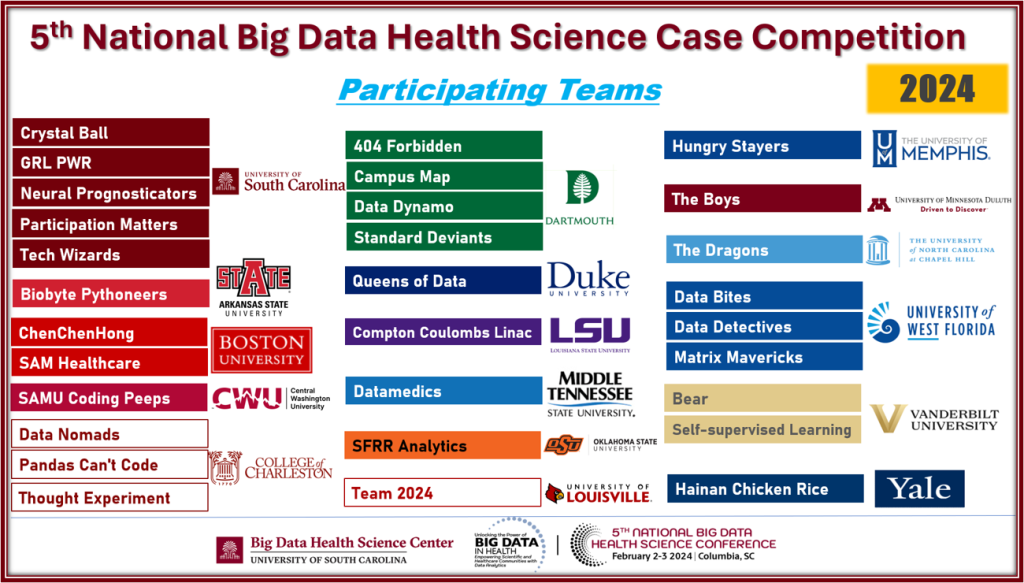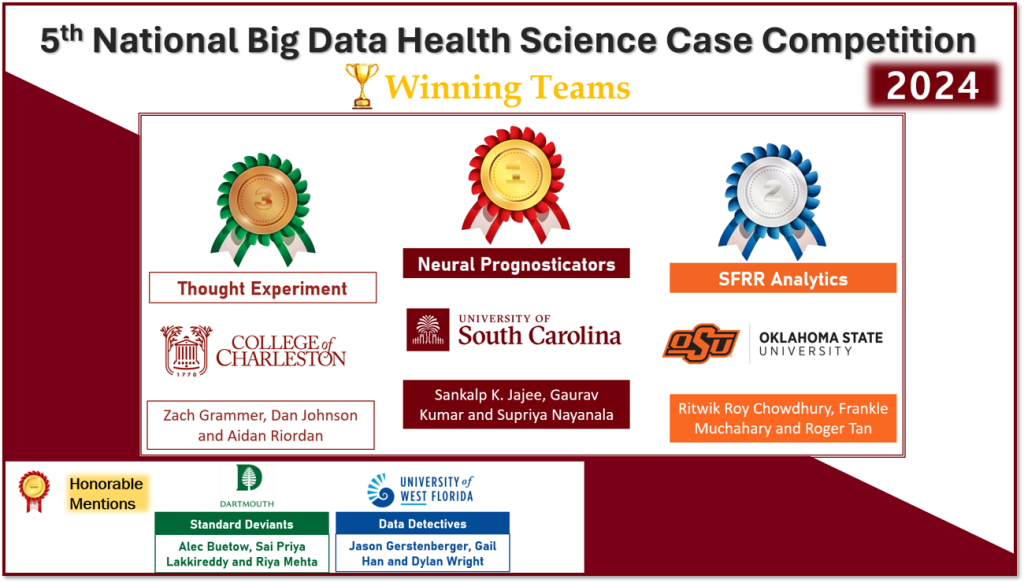A team from the University of South Carolina won the $5,000 first place prize in the 5th National Big Data Health Science Student Case Competition, which focused on developing an efficient method to classify unlabeled electroencephalogram (EEG) sleep data and deploying a machine learning model to address chronic sleep disorders.
The National Big Data Health Science Case Competition has been held by the University of South Carolina Big Data Health Science Center (BDHSC) since 2020. It takes place before the BDHSC’s other signature event, the National Annual Big Data Health Science Conference. Undergraduate and graduate students from US colleges and universities are eligible to enter the national BDHS Student Case Competition. The goal of the BDHS Case Competition is to give enthusiastic teams of graduate and undergraduate students the chance to use their skills in massive healthcare dataset analysis.

The 5th National Big Data Health Science Case Competition was held virtually on January 26 – 28, 2024. In its fifth year, it has featured 30 teams from 17 universities in the US, University of South Carolina, Arkansas State University, Boston University, Central Washington University, College of Charleston, Dartmouth College, Duke University, Louisiana State University, Middle Tennessee State University, Minnesota University-Duluth, Oklahoma State University, University of Louisville, University of Memphis, University of North Carolina at Chapel Hill, University of West Florida, Vanderbilt University, and Yale University.
The data used in this competition challenge is the outcome of the lab work conducted by Drs. Ana Pocivavsek and Snezana Milosavljevic for their research studies. Dr. Homayoun Valafar and his team curated the data for the case competition.
The year 2024’s round 1 challenge involved developing an efficient method to classify unlabeled electroencephalogram (EEG) sleep data from cutting-edge research using a group of small rodents into three vigilance states (paradoxical sleep, slow-wave sleep, or wakefulness). This is crucial for understanding sleep disorders in humans, as nearly 70 million Americans are affected by chronic sleep disorders, and automating the time-consuming manual classification process would significantly benefit both science and public health. The final round challenge aimed to address chronic sleep disorders by deploying a machine learning model. Finalists were tasked with selecting and justifying the best-performing model from Round 1, using it to classify unlabeled sleep EEG data, and providing a measure of reliability and deployment readiness in a clear and compelling presentation.
It took 34 hours to devise the solutions in the preliminary and final rounds over 2 days. Each team presentation was judged by a panel of three to five judges. In addition to a panel of three technical judges, there were 17 judges who were composed of industry, government, and academic representatives. The judges are presented and recognized for their time and efforts. After the preliminary round presentations, nine teams competed in the final round.

Thomas Chandler, Dean, Arnold School of Public Health, and Professor, Environmental Health Sciences, at the University of South Carolina, announced the winners at the opening remarks of the 5th National Big Data Health Science Conference on February 2, 2024. The top award of $5,000 went to Sankalp K. Jajee, Gaurav Kumar, and Supriya Nayanala from the University of South Carolina, SC. The winners of second place, which was $3,000, were Ritwik Roy Chowdhury, Frankle Muchahary, and Roger Tan from Oklahoma State University in Stillwater, OK. The winners of third place, which was $2,000, were Zach Grammer, Dan Johnson, and Aidan Riordan from the College of Charleston in Charleston, SC. Additionally, the teams of Alec Buetow, Sai Priya Lakkireddy, and Riya Mehta from Dartmouth College, Hanover, NH, and Jason Gerstenberger, Gail Han, and Dylan Wright from the University of West Florida, Pensacola, FL, received honorable mentions of a $500 prize at the 2024 National Big Data Health Science Student Case Competition.
The National Big Data Health Science Case Competition is designed to be an experiential learning opportunity that assesses students’ analytical, collaborative, teamwork, communication, and presentation abilities in order to contribute to the development of a talent pipeline in big data health science.
“The competition pushed us to think beyond conventional boundaries, inspiring us to develop innovative solutions that have the potential to revolutionize the health science landscape. The experience allowed us to channel our creativity and problem-solving skills in unprecedented ways,” said Nayanala. “I registered almost at the last minute for this competition, and in hindsight it seems like the best decision I have made in recent times. The competition gives a chance to work on real life data and an opportunity to build something that could have a potential impact on millions of lives; working on this real-world problem and applying all my learnings was the highlight of the challenge for me,” added Kumar. “This competition was a wild ride through data jungles, with each round sharpening our skills and our sense of humor. We learned that with the right team, even 3 AM data crunching can turn into a laughter session,” told Jajee.
“The competition not only challenged our analytical skills but also provided a platform to apply theoretical knowledge to real-world scenarios. The well-structured challenge encouraged collaboration, critical thinking, and effective communication amongst our team,” said Chowdhury. “This competition taught us about the need for doing our due diligence with respect to carrying out background research. It was a great learning experience because we not only had to come up with the solution but also with a plan to productionize our solution,” said Muchahary. “One of the most crucial pieces of this competition was to really understand the data before diving into brainstorming for solutions. We had little domain knowledge for which we had to spend considerable hours in understanding the data to be able to craft a meaningful solution,” said Tan.
“This competition was a lot of fun and a very valuable learning experience. Learning all about sleep while not sleeping much at all was an enjoyable irony. Being a sophomore in an undergraduate computer science program forced me to develop my skills quickly,” said Grammer. “The competition this year was exciting, interesting, and challenging. While we had learned much about computer science, data science and machine learning through classes, we hadn’t been exposed to sleep research. We found ourselves investigating white papers on the topic to engineer features and solve the problems as they presented themselves, and this enhanced the connection between academia and industry for me. Working in a team environment was enjoyable and, while we didn’t get much sleep ourselves, we felt that our work could make a difference to the field of sleep research,” said Johnson.
Additionally, the competition gave students a chance to present their findings and suggestions to a diverse panel of judges drawn from the business, academic, and healthcare industries.
“Presenting to a panel of professionals from industry and academia allowed me to hone my communication skills for complex data science. As a multidisciplinary undergraduate team, I appreciate being thrown in the deep and am proud of what we have accomplished,” said Riordan. “The judges are very helpful and provide actionable feedback, Overall, it’s a great learning opportunity for anyone who is passionate about data and problem-solving,” told Kumar. “We appreciate the opportunity to expand our network, learn from industry professionals and academics, and at the same time gain exposure to cutting-edge trends in big data healthcare analytics. The professionalism of the organizing team and the quality of feedback received showcased University of South Carolina’s commitment to excellence in analytics education. Overall, the University of South Carolina Big Data Healthcare Analytics Competition was extremely fun, contributing significantly to our growth as data science professionals. We highly recommend it to graduate students seeking a collaborative challenging,” added Team SFRR Analytics. “Working with data that we did not have a background in forced us to not only apply data science skills to data, but also allowed us to learn all about sleep states, sleep disorders, and ways our models could be applied in real-world uses to help people. I really want to thank all of the judges and organizers for their hard work in putting this fantastic competition together,” said Grammer.
A Special Thanks to Our Judges
Each team’s presentation was judged by a panel of three to five judges. Each judging panel was composed of industry and academic representatives. Additionally, a panel of three technical judges assessed the teams’ analysis results and scored them according to accuracy. The BDHSC appreciates the judges’ contributions of knowledge a lot; without them, this competition would not have been feasible.
Industry and Government
- Susan Burroughs, FACHE
- Bob Doran, Applications Scientist, University of South Carolina
- Chandra Dronavajjala, Data Scientist, CVS Health
- Sue Haddock, Associate Chief of Staff for Research (ACOS-R), WJB Dorn VA Medical Center in Columbia, SC
- Jacqueline (Jackie) Johnson, Principal Analytical Training Consultant, SAS
- Mitesh Mangaonkar, Tech Lead Data Engineer, Airbnb
- John McCall, Principal Technical Training Consultant, SAS
- David Reddy, Research Facilitator, University of South Carolina
Academia (External)
- Carla Sampson, Ph.D., Clinical Associate Professor, Clinical Associate Professor, Director of Healthcare Programs, New York University
- Theodoros Giannouchos, Ph.D., Assistant Professor, University of Alabama at Birmingham
Academia (Internal)
- Hamid Abdollah, PhD, Postdoctoral Fellow, University of South Carolina
- Forest Agostinelli, Ph.D., Assistant Professor, Computer Science and Engineering, AI Institute USC College of Engineering and Computing
- Denise Davis, Informatics PhD Student, Department of Integrated Information Technology, University of South Carolina
- Sara B. Donevant, PhD, RN, CCRN, Assistant Professor, Biobehavioral Health & Nursing Science, USC College of Nursing
- Kevin Lu, Ph.D., Associate Professor Clinical Pharmacy and Outcomes Sciences (CPOS), USC College of Pharmacy
- Nabil Natafgi, Ph.D., MPH, CPH, Assistant Professor, Associate Director of the Patient Engagement Studio, Health Services Policy & Management, USC Arnold School of Public Health
- Ismaeel Yunusa, Ph.D., Clinical Pharmacy and Outcomes Sciences (CPOS), USC College of Pharmacy
Technical Judges
- Homayoun Valafar, Ph.D., Professor, Chair, Computer Science & Engineering, Biomedical Engineering, USC College of Engineering and Computing,
- Andrew Smith, Ph.D. Student, University of South Carolina
- Mehdi Yaghouti, Post Doctoral Researcher, University of South Carolina
